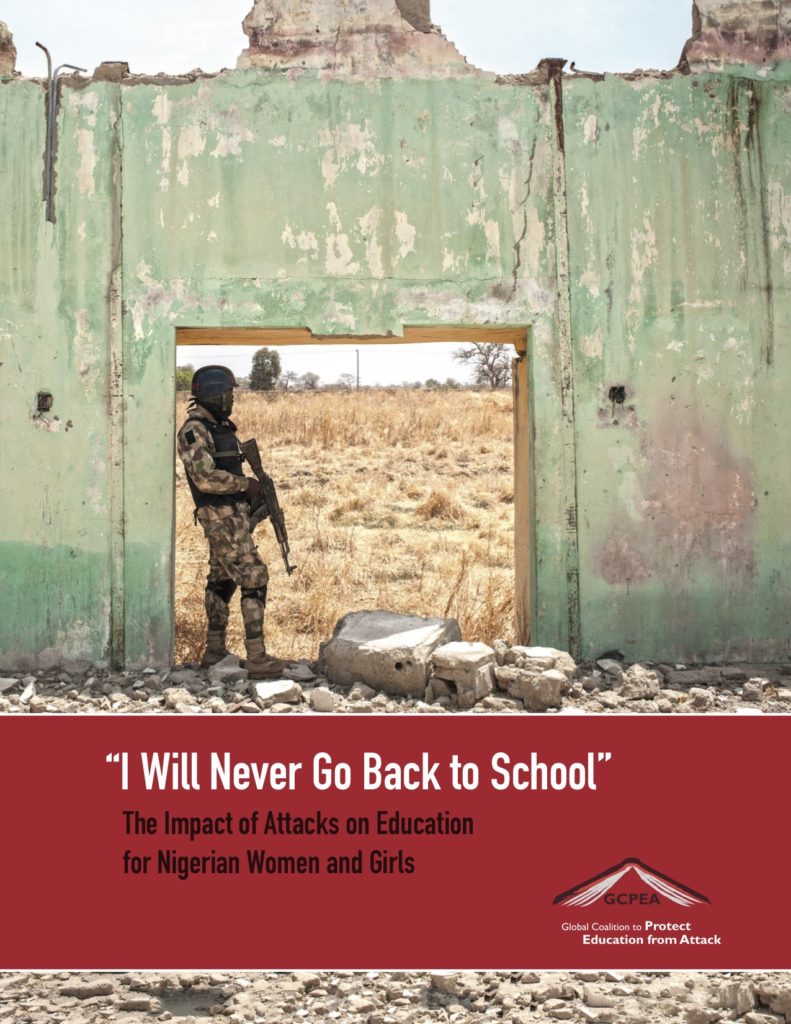GCPEA News
Nigeria: Girls Describe Devastating Impact of School Attacks
GCPEA PRESS RELEASE, October 11, 2018
(New York, October 11, 2018) – Attacks on education by the insurgent group Boko Haram have caused horrific and long-term suffering for female students and teachers in northeastern Nigeria, said the Global Coalition to Protect Education from Attack (GCPEA) in a report released today.
Boko Haram has abducted over 600 girls and young women from school during the nine-year conflict, with some held in captivity for years, and many experiencing harmful repercussions long after they return home.
The 106-page report, “‘I Will Never Go Back to School’: Impact of Attacks on Education for Nigerian Women and Girls,” is based on interviews with 119 victims and eyewitnesses of attacks on schools and education, including survivors of the three largest school abductions in Nigeria: Chibok (April 2014), Damasak (November 2014), and Dapchi (February 2018). Women and girls speak out about their terrifying experiences, including forced conversion to Islam, forced “marriage,” rape, and other physical and psychological violence, in the report.
“Boko Haram is still targeting girl students for unimaginable violence and abuse,” said Diya Nijhowne, GCPEA’s Executive Director. “The abduction this year of 111 girls from their school in Dapchi – over four years after the Chibok tragedy – underscores the urgent need for Nigeria to enhance school security and protect female students and teachers.”
Some victims never return home. Among those who do, many reported suffering mental and physical health problems because of violence and abuse. Some continued to experience bleeding and other serious gynecological problems because of rape. Survivors described recurring nightmares, anxiety, being easily frightened, an inability to focus, and other signs commonly associated with trauma.
GCPEA interviewed women and girls who described Boko Haram forcing them to convert to Islam and to “marry” its fighters. Others reported being held in prison-like conditions, where they were repeatedly raped. Some ultimately became pregnant because of rape. Some victims, especially those who refused to convert to Islam or “marry” a fighter, also reported being forced to work long hours for the wives and families of insurgents and being threatened and beaten when they were too exhausted to continue. Some girls and women were forced to participate in or aid Boko Haram attacks.
Boko Haram has increasingly used suicide bombers to carry out attacks, and the majority of these have been female. Although difficult to verify, experts believe that most child suicide bombers were abducted.
Attacks on schools and the threat of abduction can make it difficult for girls to continue with their education. Many girls reported being forced to suspend their education after their school was attacked or permanently dropping out of school because of the attacks.
Teenage girls who are not in school are more vulnerable to numerous risks, including early pregnancy, and lost opportunities for personal autonomy, employment, and economic independence. Being out of school, even for relatively short periods, also increases the risk of early marriage for girls. Once married, girls often find it difficult to return to school because of household responsibilities or opposition from their husbands. Early pregnancy is a further impediment to attending school, as well as increasing the risk of sexually transmitted infections, exposure to HIV, and a host of pregnancy-related complications.
Girls and women have the right to education without fear of threats, harassment, abduction, or sexual violence. Even in the context of an active conflict, effective strategies can reduce harm to male and female students, including endorsing and implementing the Safe Schools Declaration.
The Safe Schools Declaration is an intergovernmental political commitment to protect students, teachers, schools, and universities from attacks by armed forces and armed groups, as well as to restrict military use of educational infrastructure. The declaration includes a range of commitments, linked to specific, concrete actions that can reduce the risk of attack and mitigate their impact. Since May 2015, 81 countries from all regions of the world have endorsed the Safe Schools Declaration, including Nigeria. While Nigeria has taken steps to implement the declaration and protect education, the girls and women GCPEA interviewed expressed continued fear about security at schools and were afraid to return.
Attacks on education have a devastating impact far beyond Nigeria. GCPEA has documented more than 12,700 attacks, harming more than 21,000 students and educators in at least 70 countries between 2013 and 2017. While attacks on education have a devastating effect on all students and teachers, girls and women often experience different kinds of abuse, with different long-term consequences.
“On this International Day of the Girl Child, governments should protect girls’ education by endorsing the Safe Schools Declaration and implementing it effectively to address the particular impact of abuses on women and girls,” said Nijhowne. “By doing this, governments will better ensure that all students and educators, male and female, can learn and teach in safety.”
Learn more on how to better protect women and girls from attacks on education >>





